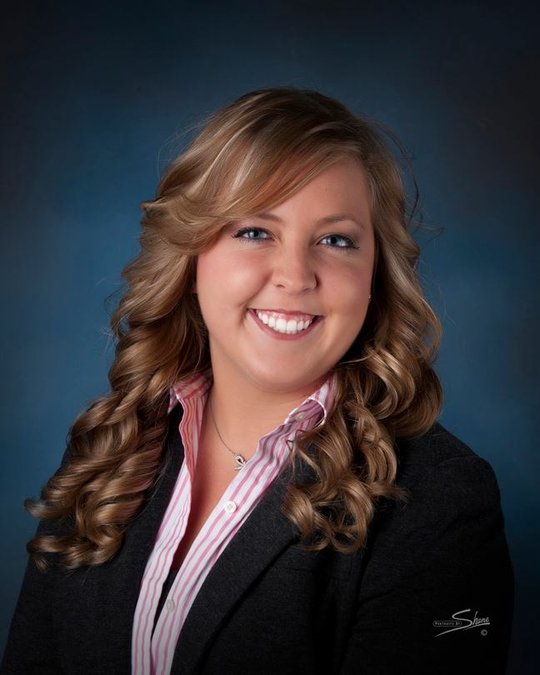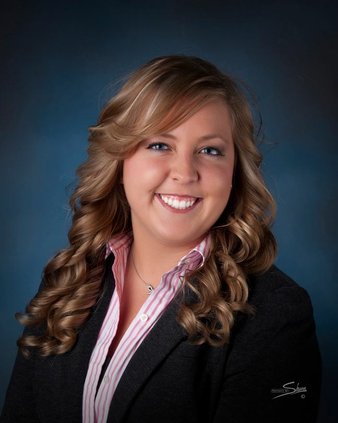Editor’s note: This is the first of two stories on Wednesday’s Legislative Coffee.
With a busy session in the Kansas State Legislature in recess, three legislators representing parts, or all, of Barton County, paid a visit to the Great Bend Chamber of Commerce office Wednesday morning for a Legislative Coffee to update residents on items of concern being addressed by the state lawmakers during this term. State representatives Tory Arnberger-Blew, District 112 (R-Great Bend), Troy Waymaster, District 109 (R-Bunker Hill) and Sen. Alicia Straub, District 33 (R-Ellinwood) were all present to share their perspectives on a wide variety of pressing issues facing the state of Kansas.
State budget process
Both Arnberger-Blew, who is on the House Government Budget Committee, and Waymaster, who is the chairperson of the House Appropriations Committee, discussed this year’s budget process at length.
The Government Budget Committee oversees approximately 30 different budgets for various different state government entities.
Waymaster said entering this legislative session with an unexpected $3 billion surplus actually made this year’s budget process more challenging in the legislature. “It’s easier when we don’t have money than when we do, because you have everybody wanting to get a piece of the pie.”
He said the approach in the Legislature became much like that of personal finances, where the main goals became paying down debt the state has accrued, setting aside money in savings, and then identifying the best ways to spend the remainder of the funds.
Arnberger-Blew said one pertinent need addressed with the surplus was allocating to a chronically-underfunded Kansas Public Employees Retirement System (KPERS). $1.3 billion of the surplus was allocated to the system, leaving KPERS at 80% of its needed funding level.
Straub said she voted against the budget, which passed April 1. While she said there were good things in it, she felt it did not do enough to curb what she sees as too much government spending. With a budget in excess of $9 billion for the upcoming fiscal year, she feels the surplus the state is seeing now will be quickly used up, returning the state to a difficult financial position within a couple of years.
“I think it’s going to be very painful for everyone,” Straub said.
In that vein, $500 million was set aside for a “rainy day fund,” an economic buffer in the eventuality that the economy should take a downturn, something the legislators felt was more of a matter of “when,” than “if.”
SPARK Funding
In addition to the state budget funding process, Waymaster also is part of advisory committees in regards to administration of Strengthening People and Revitalizing Kansas (SPARK) grant funding. These are American Rescue Plan Act (ARPA) funds totalling approximately $1.6 billion the state received from the federal government in response to COVID-19.
$500 million of that went immediately to replenish the state’s Unemployment Trust Fund, which was decimated in the aftermath of COVID-19 due to high unemployment and significant amounts of fraudulent claims.
After various other allocations by the State Finance Council, of which Waymaster is a member, and by the governor, it left about $631 million in funds to be allocated. With that, Waymaster said, the state sought to address pressing economic development needs including post-secondary education and rural housing, totalling about $400 million.
The competition for those funds was stiff, he said. The state received nearly 800 applications totalling $13 billion, so whittling it down has been a challenge. Many of the applications they received, though, did not meet qualifications for receipt of ARPA funds.
He is chairperson of an advisory panel making recommendations to the State Finance Council on how to allocate the funds. That process is still in the works, he said.
Sales Tax
Another key legislative item the legislators addressed were efforts to either eliminate or reduce the state’s sales tax on food, the so-called, “Axe the Tax” efforts.
Straub indicated she felt the issue was unlikely to pass because Republican leadership in the Senate was hesitant to hand Gov. Laura Kelly a “political win” in an election year, “at the expense of the taxpayer, once again.”
According to Straub, research indicates elimination of the food sales tax would save the average taxpayer $500 or more per year, accounting for the rise in inflation.
However, all legislators present expressed some hesitancy in eliminating the food sales tax altogether, preferring a potentially incremental approach to reducing the tax, which generates about $500 million per year in revenue for the state. Arnberger-Blew said discussions between Republicans and Democrats on the issue broke down late in the session, with many Democrats preferring to completely eliminate the tax. She expects discussions to continue on the issue, however, when the Legislature reconvenes April 25.
Many municipalities have actually expressed opposition to the elimination of the tax, Arnberger-Blew said, because many of them draw significant portions of their revenue from sales tax, which would leave them with large shortfalls.
Instead of complete elimination, Waymaster favors a reduction in the food sales tax. Doing so would allow Kansas to remain competitive with neighboring states Oklahoma, Missouri and Nebraska.
Addressing this issue, however, led Waymaster to express frustration on infighting with the legislature over sales tax as a whole.
Early in the session, the Senate passed a bill providing a sale tax exemption for recuperation of losses related Dec. 15, 2021 wildfires that decimated a four-county area in northwest Kansas. However, he said the house roped the issue in with other sales tax bills, delaying passage of the relief bill until April 1, which he said was far too late for rural residents struggling mightily to recover from the fires. After personally witnessing the devastation the fires caused, he felt the legislative process did the people who suffered heavy losses a disservice.
“I wish that particular sales tax bill had not been held hostage, because we needed to get relief to those farmers and ranchers that lost everything,” Waymaster said.
The issue, he said, led to an argument over the disproportionately rapid response to later fires in Reno and Harvey counties with Adjutant General Maj. Gen. David Weishaar. “I was so frustrated with how that was handled (by the Kansas Division of Emergency Management) between the two fires.”
Straub also addressed what she saw as friction between the two houses toward the end of the first portion of the legislative session. This friction, she said, led to several Senate bills, like the fire aid bill, being held up due to the House adjourning prior to the Senate, because of what she called the Speaker of the House, “(getting) mad on the playground, (he) threw the ball down, and left the play yard.”





